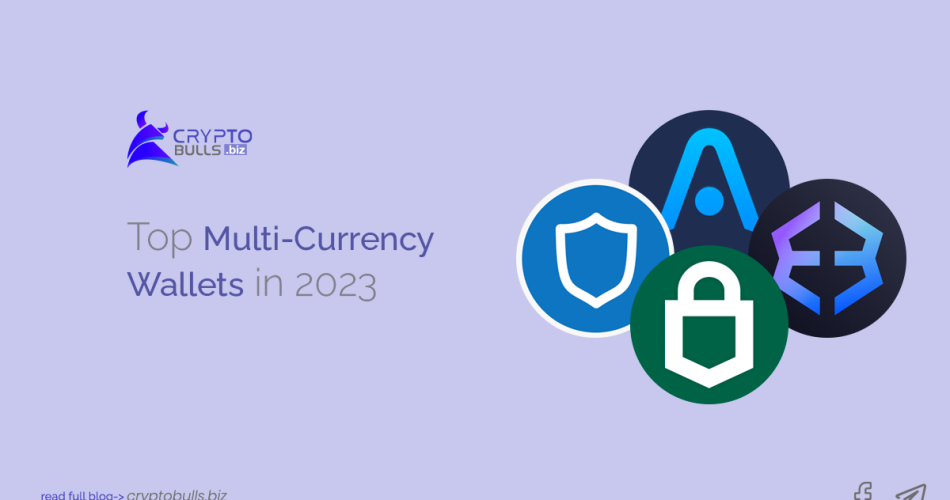The Top 5 Multi-Currency Wallets in 2023
Choosing the correct multi-currency wallet is critical in the ever-changing world of cryptocurrencies. Each choice has its own set of benefits and cons. To help you make an informed decision, we explain the advantages and cons of the top six multi-currency wallets for 2023 and answer some frequently asked concerns. There are numerous multi-currency wallets available in the crypto market. The security, features, and user experience of these wallets vary. The top six multi-currency wallets to consider are as follows:
- Atomic Wallet
Atomic Wallet is a versatile wallet available for both desktop and mobile users. It supports a vast array of over 500 cryptocurrencies and tokens. It is distinguished by its non-custodial nature, which indicates that users retain complete control over their private keys. Furthermore, Atomic Wallet includes an incredible set of features, like built-in exchanges, staking possibilities, and a dApp browser.
Pros
Non-custodial, giving you complete control over your private keys.
Supports an extensive range of over 500 cryptocurrencies and tokens.
Features built-in exchanges, staking, and a dApp browser.
Available on both desktop and mobile platforms.
Cons
Some users have reported occasional slowdowns.
Customer support may be lacking at times. - Trust Wallet
Trust Wallet is a mobile wallet that lets people store more than 4.5 million digital assets. Similar to Atomic Wallet, Trust Wallet is non-custodial and boasts built-in exchange functionality, staking, and even support for NFTs.
Pros
Non-custodial, ensuring full control of your assets.
Impressive support for over 4.5 million digital assets.
Includes built-in exchange functionality, staking, and NFT support.
Ideal for mobile users.
Cons
Limited to mobile platforms.
A few users have expressed concerns about security.
- Exodus
Exodus is a multi-currency wallet for both desktop and mobile platforms supported. With support for over 200 coins, Exodus has quickly become a favourite among cryptocurrency fans. Its features include built-in exchanges, staking capabilities, and a portfolio tracker.
Pros
Non-custodial, giving you authority over your private keys.
Supports a diverse selection of over 260 cryptocurrencies and tokens.
Features built-in exchanges, staking options, and a portfolio tracker.
Both desktop and mobile devices are supported.
Cons
Customer support might not always meet expectations.
Users have occasionally experienced sluggish performance. - Trezor and Ledger Nano X/S
For those who prioritize security above all else, hardware wallets like Trezor and Ledger Nano X/S are excellent options. These devices support more than 1,000 cryptocurrencies and tokens. Hardware wallets are renowned for their unparalleled security as they store private keys offline on a physical device.
Pros
Unparalleled security by storing private keys offline on a physical device.
Extensive support for over 1,000 cryptocurrencies and tokens.
It offers multiple models to choose from.
It is ideal for those who prioritize security above all else.
Cons
Generally more expensive than software wallets.
Hardware wallets can be more complex to set up and use.
Ledger Nano X
Pros: Larger screen, greater storage capacity, Bluetooth connectivity, extensive cryptocurrency support.
Cons: Higher cost compared to the Nano S.
Ledger Nano S
Pros: Compact and cost-effective, wide cryptocurrency support.
Cons: Smaller screen, limited storage capacity, lacks Bluetooth connectivity.
- Coinomi
Coinomi Coinomi is yet another non-custodial wallet that is accessible via desktop and mobile devices. It supports over 1,770 different coins and tokens. Like the others, Coinomi has built-in exchanges, staking capabilities, and a portfolio tracker.
Pros
Non-custodial, giving you complete authority over your assets.
Supports over 1,770 different coins and tokens.
Built-in exchanges, staking mechanisms, and a portfolio tracker are all included.
Desktop and mobile platforms are both supported.
Cons
Like Atomic Wallet, some users have reported customer support issues.
Occasional performance slowdowns have been noted.
So, how can you know which multi-currency wallet is best for you? Your personal needs and tastes will guide your decision.
The decision is based on your personal needs and preferences. If you prioritize security and a wide range of features, hardware wallets like Trezor or Ledger Nano X/S are solid choices. On the other hand, if user-friendliness is your top priority, software wallets like Atomic Wallet, Trust Wallet, Exodus, or Coinomi are excellent options.
Our Choice: Trezor
Trezor stands as a well-recognized brand in the realm of hardware wallets, renowned for its top-tier security features. Hardware wallets, such as Trezor, offer the utmost protection for your cryptocurrency holdings. They achieve this by storing your private keys on a physical device, effectively minimizing susceptibility to hacking in comparison to software wallets.
Trezor devices are fortified with various layers of security. This includes creating a PIN code, an optional passphrase, and a recovery seed, which is a 12-24-word phrase. This recovery seed acts as a lifeline, allowing you to restore access to your wallet in the event of a lost device or a forgotten PIN code.
To get started with a Trezor hardware wallet, simply follow these simple steps:
Generate a Recovery Seed: Create a recovery seed by generating a 12-24-word phrase. This seed is your safety net, ensuring you can recover your wallet if it’s ever misplaced or your PIN code is lost.
Make a PIN and password: Make a PIN code for your wallet and think about adding a second passcode for more security.
Connect and Install: Connect your Trezor device to your computer or smartphone, then install the Trezor Suite software. This step allows you to interface with your hardware wallet seamlessly.
Create Your Wallet: Utilizing your Trezor device, create a wallet and take note of the wallet address. This address is where you can securely store many cryptocurrencies and tokens.
The Ledger Nano X and Nano S serve as robust hardware wallets, ensuring the safety of your cryptocurrency private keys by keeping them offline. This approach offers enhanced security compared to software wallets or keeping your digital assets on exchanges. These wallets are equipped with a Secure Element (SE) chip, an impenetrable component also utilized in credit cards and other high-security devices.
The Ledger Nano X is the more sophisticated option when considering the two. It boasts a larger screen, increased storage capacity, and the convenience of Bluetooth connectivity. However, this expanded feature comes at a premium cost of $149. The Ledger Nano S, on the other hand, is a more compact and cost-effective alternative that starts at $79. While it does not support Bluetooth, it can be connected to a computer via USB.
These wallets support many cryptocurrencies, including prominent alternatives like Bitcoin, Ethereum, Litecoin, XRP, and many more. The Ledger Live program, which is compatible with your PC and smartphone, simplifies managing your crypto holdings.
In choosing between the two Ledger wallets, your decision should align with your specific requirements and budget. Opt for the Ledger Nano X if you seek advanced features and security. If you are more budget-conscious or find the extra features of the Nano X unnecessary, the Nano S is a practical choice.
Conclusion
Choosing the right multi-currency wallet is a personal decision, hinging on your unique needs and priorities. If security is paramount and you seek various features, hardware wallets like Trezor or Ledger Nano X/S are robust options. On the other hand, if user-friendliness tops your list, software wallets such as Atomic Wallet, Trust Wallet, Exodus, or Coinomi are excellent choices.
It’s essential to acknowledge that all crypto wallets carry some risk. Thorough research and selecting a wallet with a solid reputation and proven security track record are crucial to protecting your assets.
Frequently Asked Questions (FAQs)
Q1.What exactly is a multi-currency wallet?
A multi-currency wallet is a digital tool that allows you to store, send, and receive multiple cryptocurrencies and tokens all on the same platform. When dealing with various assets, this eliminates the need for multiple wallets.
Q2: How do hardware wallets differ from software wallets?
Hardware wallets keep your private keys offline on a physical device, which makes them extremely safe but possibly less user-friendly and more expensive. While software wallets are more handy, they may be more vulnerable to online attacks.
Q3: What should I look for in a multi-currency wallet?
Security, features, customer service, ease of use, pricing, reputation, fees, and regular updates are all important considerations. Make your selection based on your individual preferences and demands.
Q4: Is there a risk associated with all crypto wallets?
Yes, every crypto wallet carries some level of risk. It’s important to exercise due diligence by selecting a wallet with a strong reputation and security track record.


